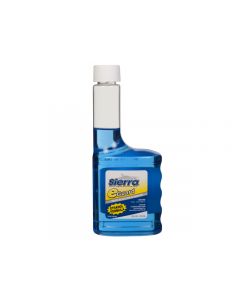Boat Fuel Additives And Gas Treatments
Boat Fuel Additives & Gas Treatments How-Tos
Why Every Boater Needs To Use Boat Fuel Additives
One of the products that should be on a boater's must-have list is boat gas treatments. These products play a vital role in improving performance and also extending the life of the inboard, sterndrive or outboard motor. All engines will suffer from the ethanol effect. Marine gases typically contain 10% ethanol (E10) and 90% fuel. The shelf life of ethanol (E10) is approximately 30 to 45 days. It will start breaking down hence forming water after prolonged storage or non-use. The water may damage the engine and also produce poor performance. Such a disaster can be avoided by using gas treatments.
What is a Boat Fuel Additive?
Additives are a product that is added to the gas. It is introduced into the gas tank during normal operation and also as part of winterizing the gas. The compound is comprised of substances that improve the viscosity while protecting and promoting proper combustion. The effectiveness of the additive will vary depending on the engine type and intended use. Some products are for small outboards; others are suitable in outboards, while some products are for large commercial engines. Additives for gasoline and diesels are quite different.
Properties
Additives added to marine gas come in different types. They can be categorized according to the chemical properties. These are as follows:
Stabilization:- gas is sourced from different regions. It is also refined using different methods. To make certain the gas meets the local standards; a gas stabilizer is added to keep the gas stable even in varied temperatures and environments.
Ethanol Treatment:- treatment are added to stop ethanol from breaking down and forming water when not in use.
Octane Improvement:- Octane (RON) determines how completely a gas will burn. High levels of octane mean better and thorough burn. However, too much may lead to detonation (pre-ignition). Gas Treatments increase the octane to safe levels.

Effects of Not Using Marine Gas Treatments
Quite a few boaters don't add gas additives to their tank. Many will argue that their engines still run fine. In fact, some view this as a new concept considering they have been brought up in a boating environment. Well, by not using treatments, you run the following risks;
Damaging the engine:- The breakdown of ethanol makes the gas unstable, Using such gas can damage an engine.
Polluting the environment:- Incomplete combustion increases pollution.
High costs of gas:- low combustion or poor burning leads to wastage.
Poor performance:- low octane contributes to inadequate performance and inefficiency. Too much ethanol (above 10%) i.e. E15, E20, E25 or higher will damage most engines.
Why Use Gas Treatments?
The performance and durability of the boat's engine are very critical. A boater desires to have an engine that runs smoothly and uses minimum gas. However, modern gases will always fall short in many aspects. Additives improve the lubrication hence protect the engine. They also contain detergents that clean the internals during operation. In addition, complete combustion will reduce the emission or pollutants. Gas treatments also reduce the condensation or water that forms during storage that usually occurs during winter storage. You will be more relaxed knowing the gas stored in your tank can be used and won't cause any harm.
Maybe you've never used a gas treatment, or you have just been using any brand. Well, from the above information, it's clear that the type of product does matter. The higher the grade or quality, the more advantageous it is. The first step to getting a good product is research. Find out more about your engine, type of use, and the environment. With these details, browse iboats.com wide range of marine gas additives and stabilizers. Although they play a similar role, boat gas treatments should not be mixed. Use a particular product meant for that type of engine.
Problem-free Gas Tips for Boat Performance
Article by Tim Banse, Marine Engine Digest
 This boating season, and depending on how you handle it, gas will either be a nagging problem or no problem at all. Here's what you need to know, along with a few tips on keeping your boat running strong all season long.
This boating season, and depending on how you handle it, gas will either be a nagging problem or no problem at all. Here's what you need to know, along with a few tips on keeping your boat running strong all season long.
It's no secret alcohol-laced gasoline creates a boat load of problems including absorbing moisture out of the atmosphere. There's also the fact that E-5 through E-85 gasoline shelf life is notoriously short. After about a month's time the petro chemical begins to degrade into nasty gum and varnish that clogs up gas injectors and carburetor passages.
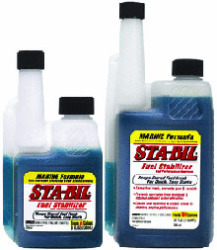
Obviously it's common sense to avoid alcohol altogether. Do that by scouting out marinas that sell unadulterated gasoline. Ask around. That said, it's understandable that trailer boaters are tempted to pull up to a land-based gas station to top off with the less expensive road tax Regular gas. But whenever you use automotive gas, be sure to dose the gasoline with marine-specific stabilizer before you start pumping. And no matter what the brand name of the stabilizer, before you even open the can, read the label and follow its instructions to the letter. Know that in general, the greater the concentration of stabilizer - the number of ounces added per gallon of gas - the longer the protection before it begins to sour. StarTron is a reputable product that I use. It's easy to spot on the shelf, it's blue like windshield washer fluid. Another contender is Sierra's eGuard , it too is blue, and Gold Eagle's Sta-Bil Marine Formula Fuel Stabilizer.
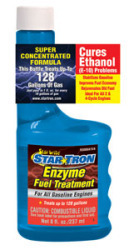
It's also important to know that alcohol gas burned within three weeks, with or without stabilizer, tends to be problem free and for the same reasons your tow vehicle doesn't have an issue with the stuff. The passage of time is the enemy of E-10 and E-15. Figure on a shelf life of about three to four weeks before the gas rots and water seeps in.
Meanwhile, back at the waterfront know that some gas docks rather considerately treat their gasoline supplies with stabilizer (sometimes this means gas with alcohol - sometimes alcohol free) which means that when you top off dockside you don't have to go to the trouble or expense of popping the top on your own chemicals.
No matter what the gas source one must-have accessory item is a gas/water separator, even on those portable outboard motors rated from 2 to 30 horsepower. Costs for a portable outboard motor sized gas/water separator filter start at about $30 and replacement elements cost about $15. An element should last a whole season, or about 100 engine hours.
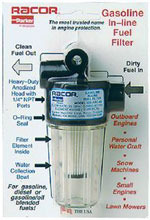
Also good to know, on these miniature water/separator/filters, the filter element proper is a tightly woven 10 micron mesh that keeps tiny bits of gum (decomposing gasoline) and other particulate matter from clogging up a small outboard motor's tiny main jet and passages.
And because alcohol is corrosive, it's pretty hard on all system components. Likely as not the day will come when you squeeze the gas primer bulb and watch in absolute horror as the contents of the bowl turn black in a swirling cloud of miniscule rubber particles. That the telltale sign that the primer bulb has rotted on the inside and may soon crack wide open and spill gas. Imagine what would have happened if the rotten rubber had flowed to the injectors or carburetor jets and you didn't have the foresight to install a filter. You may also find little yellow flecks of yellow plastic which are the broken down remains of the gas hose liner.
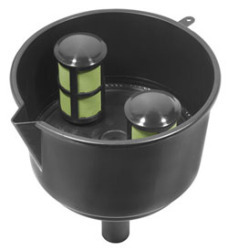
On larger boats with either gas or diesel engines it's also a good idea to have a competent gas cleansing system that begins at the gas dock. Consider pre-filtering, or pumping gas into a screened gas filter jabbed into the fill tube. Its specially coated wide mesh screen not only keeps big junk out of the tank, but also separates out any free-standing water. The water drops down into a sump and is disposed of in an environmentally friendly manner. The first time you try one of these out you might be shocked at how filthy gas can be.
If your boat is diesel powered you probably already know about the gas treatments that kill microbes, the living breathing organisms that would otherwise thrive in diesel. Kill them so they don't proliferate and damage the system. Once again, read the label and wear gloves to protect your skin.
Have a great, safe and fun boating season.
-Tim
Tim Banse is a marine engines expert and has written about propulsion for Popular Mechanics, Yachting, Motor Boating, Boating Industry and other publications around the world. His current pet project is www.MarineEngineDigest.com, a source for free information about outboard motors, stern drives and inboards. Tim's articles will be seen here and in the iboats.com blog, plus always at www.MarineEngineDigest.com.

